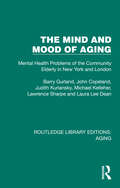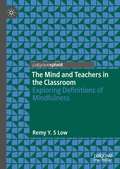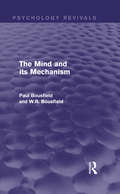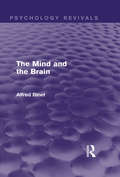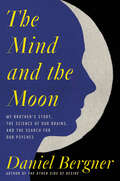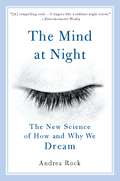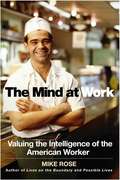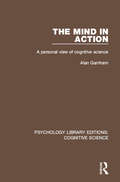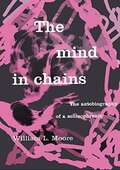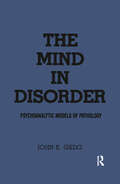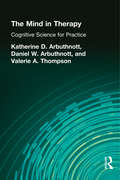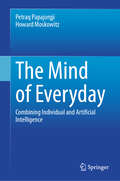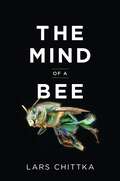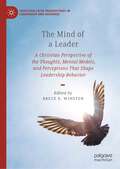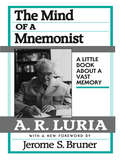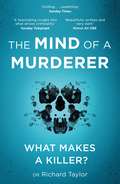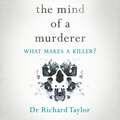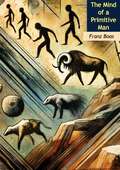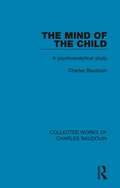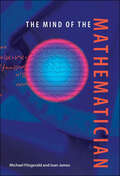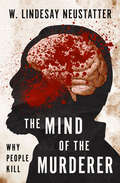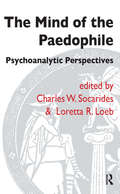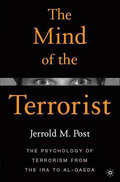- Table View
- List View
The Mind and Mood of Aging: Mental Health Problems of the Community Elderly in New York and London (Routledge Library Editions: Aging)
by Barry Gurland Judith Kuriansky Michael Kelleher John Copeland Lawrence Sharpe Laura Lee DeanOriginally published in 1983, this cross-national study had three aims. First, to examine the cross-national differences among the elderly community in the prevalence of psychiatric problems and their relationship to other health and social problems. Second, to examine the differences in health care of aged people, with a view to providing a framework for improvement of health and support services to those elderly with psychiatric problems who reside in the community. Finally, the differences in the course and outcome of psychiatric disability with implications for the role of healthcare and community resources in reducing chronic disability or its consequences.
The Mind and Teachers in the Classroom: Exploring Definitions of Mindfulness
by Remy Y. LowThis book explores what mindfulness could mean for teachers and educational researchers. Moving beyond popular platitudes about mindfulness, the author provides a conceptual map for understanding the different ways in which mindfulness can be recommended to teachers. Covering the key features of Buddhist, psychological and socially engaged forms of mindfulness, this book critically examines the different ways mindfulness is defined, what problems it is meant to address, and the ways that claims about mindfulness are made. It argues that each approach to mindfulness implies an ideal of what a ‘good teacher’ should be. It will be of interest and value to teacher educators, educational researchers and scholars of mindfulness within education.
The Mind and its Mechanism (Psychology Revivals)
by W.R. Bousfield Paul BousfieldFirst published in 1927, the original blurb reads: "Scientists are beginning to believe there is some immaterial thing which performs certain functions that the material mechanism of the brain is powerless to perform. It is the purpose of this book to explain what that immaterial thing is and how it functions. The Mind and Its Mechanism deals with a theory that may conceivably influence the study of psychology, and will interest not only psychologists, but physiologists, physicists and biologists." Now back in print, this title can be read and enjoyed in its historical context.
The Mind and the Brain: Large Print (Psychology Revivals)
by Alfred BinetOriginally published in 1907, this book explores the distinction between mind and matter. Although Alfred Binet is best known for his contributions to the study of intelligence he had other extensive research interests and published widely in many areas of psychology. This reissue is an opportunity to explore some of that work, which includes consciousness and cognition as well as definitions of psychology.
The Mind and the Moon: My Brother's Story, the Science of Our Brains, and the Search for Our Psyches
by Daniel Bergner“A profound and powerful work of essential reporting." —The New York Times Book ReviewAn important—and intimate—interrogation of how we treat mental illness and how we understand ourselvesIn the early 1960s, JFK declared that science would take us to the moon. He also declared that science would make the “remote reaches of the mind accessible” and cure psychiatric illness with breakthrough medications. We were walking on the moon within the decade. But today, psychiatric cures continue to elude us—as does the mind itself. Why is it that we still don’t understand how the mind works? What is the difference between the mind and the brain? And given all that we still don’t know, how can we make insightful, transformative choices about our psychiatric conditions?When Daniel Bergner’s younger brother was diagnosed as bipolar and put on a locked ward in the 1980s, psychiatry seemed to have achieved what JFK promised: a revolution of chemical solutions to treat mental illness. Yet as Bergner’s brother was deemed a dire risk for suicide and he and his family were told his disorder would be lifelong, he found himself taking heavy doses of medications with devastating side effects.Now, in recounting his brother’s journey alongside the gripping, illuminating stories of Caroline, who is beset by the hallucinations of psychosis, and David, who is overtaken by depression, Bergner examines the evolution of how we treat our psyches. He reveals how the pharmaceutical industry has perpetuated our biological view of the mind and our drug-based assumptions about treatment—despite the shocking price paid by many patients and the problematic evidence of drug efficacy. And he takes us into the pioneering labs of today’s preeminent neuroscientists, sharing their remarkably candid reflections and fascinating new theories of treatment.The Mind and the Moon raises profound questions about how we understand ourselves and the essential human divide between our brains and our minds. This is a book of thought-provoking reframings, delving into the science—and spirit—of our psyches. It is about vulnerability and personal dignity, the terrifying choices confronted by families and patients, and the prospect of alternatives. In The Mind and the Moon, Bergner beautifully explores how to seek a deeper engagement with ourselves and one another—and how to find a better path toward caring for our minds.
The Mind at Night: The New Science of How and Why We Dream
by Andrea RockPsychologists and philosophers have long grappled with the mysteries of dreaming, and now-thanks largely to recent innovations in brain imaging -neuroscientists are starting to join the conversation. In this groundbreaking book, award-winning journalist Andrea Rock traces the brief but fascinating history of this emerging field. She then takes us into modern sleep labs across the country, asking the questions that intrigue us all: Why do we remember only a fraction of our dreams? Why are dreams usually accompanied by intense emotions? Can dreams truly spark creative thought or help solve problems? Are the universal dream interpretations of Freud and Jung valid? Accessible and engaging, The Mind at Night shines a bright light on our nocturnal journeys and tells us what the sleeping mind reveals about our waking hours.
The Mind at Work: Valuing the Intelligence of the American Worker
by Mike RoseIn the tradition of Barbara Ehrenreich's "Nickel and Dimed" and Studs Terkel's "Working", "The Mind at Work" is an illuminating reassessment of American labor. Testimonials to physical work have always celebrated the dignity, the economic and moral value, even the nobility of blue-collar labor, but rarely the thought required to get the job done right. The lightning-fast organization and mental calculations of the waitress; the complex spatial mathematics of the carpenter; the aesthetic and intellectual dexterity of the hair stylist, our failure to acknowledge or respect these qualities has undermined a large portion of America's working population. Integrating personal stories of his own working-class family with interviews, vivid snapshots of people on the job, and current research in social science and cognitive psychology, Rose draws a brilliantly original portrait of America at work. As he probes the countless decisions, computations, and subtle judgments made every day by welders and plumbers, waitresses and electricians, Rose redefines the nature of important work and overturns the "hand/brain" dichotomy that blinds us to the real contributions of working people.
The Mind in Action: A Personal View of Cognitive Science (Psychology Library Editions: Cognitive Science)
by Alan GarnhamCognitive science – which draws on ideas from psychology, philosophy, linguistics and artificial intelligence (AI) – attempts to explain our mental life within a scientific framework. Its goal is, thus, to remove the last major obstacle to a unified scientific account of the natural world. In this title, originally published in 1991, Alan Garnham provides an invaluable introduction to this exciting new development in the study of mind. The Mind in Action focuses on the development of a systematic explanation of cognition, rather than on facts about the way we perceive things, remember them, talk about them, think about them, and interact with them. The author looks in detail at the nature of scientific explanations, the reasons for developing them, and the way they are assessed. He describes the work carried out by cognitive scientists and considers the questions that motivate it. He introduces the computational metaphor for the mind, and explains how flushing out the metaphor might lead to an integrated scientific account of mental phenomena. Designed primarily for people about to embark on courses in cognitive science and related disciplines, The Mind in Action captures the liveliness and excitement of debates about the mind. It is readily accessible to anyone with an interest in how the mind works, avoiding technical terms where possible and explaining them fully where they are necessary.
The Mind in Chains: The Autobiography of a Schizophrenic
by William Lewis MooreIn this classic account of schizophrenia, Moore describes his struggle with madness. "How does it feel to be treated as mad? How do things look to you? And, above all, how do you preserve hope and dignity and keep your identity in a hospital for the insane? This unique and powerful book is authored by an ex-Marine and graduate student who suddenly finds himself stigmatized as a schizophrenic and committed to an insane asylum. It lays bare the secrets and hiding places of the soul with a frankness that will astonish the reader." From Dust Jacket. The "Mind in Chains" combines the interest of a study of schizophrenia with the fascination of a detective story.
The Mind in Disorder: Psychoanalytic Models of Pathology
by John E. GedoAnchoring his schema in the belief that nonorganic disorders are disturbances in adaptation explicable within a depth-psychological framework, Gedo posits two broad categories of functional disorder: "apraxias" that represent any failure to learn adaptively essential skills, and disorders of what her terms "obligatory repetition." Within both categories of disorder, Gedo avers, the vicissitudes of mental functioning are understandable in terms of regression to relatively archaic modes of function and the reversal of regression and return to expectable modes of adult function. It follwos from Gedo's understanding of how and why the mind becomes disordered, that diagnosis utilizing psychoanalytic principles can only be based on the succession of transference constellations encountered in treatment, since these constellations invariably pinpoint the developmental impasses in which maladaptive repetitive patterns and the failure to learn basic psychological skills are rooted. For purposes of understanding a variety of apraxic and repetitive disorders, Gedo equates such basic skills not only with the three major psychobiological attainments he has invoked in the past, but with the development of adequate perception, cognition, affectivity, and communication skills. Beautifullu organized, lucidly written, and richly illustrated with case vignettes, The Mind in Disorder is not only the thoughtful yield of an outstanding clinician's three decades of experience. It is also the first psychoanalytic book since Otto Fenichel's masterwork of 1945, The Psychoanalytic Theory of Neurosis, to take the issue of how we conceptualize psychopathology as its central focus.
The Mind in Therapy: Cognitive Science for Practice
by Valerie A. Thompson Katherine D. Arbuthnott Dennis W. ArbuthnottHuman mental capacities and processes are the raw materials with which psychotherapists work. Thus what cognitive scientists have discovered in recent decades is potentially tremendous value for psychotherapeutic practice. But the new knowledge is not readily accessible to therapists, who find both language and methodology off-putting.The Mind in Therapy bridges the gap. It offers a comprehensive overview of the relevant range of cognitive activities, ranging from complex mental operations such as problem solving, decision making, reasoning, and metacognition to basic functions such as attention, memory, and emotion. The authors integrate key new findings about the interaction between cognition and emotion, inhibition, and counterfactual thinking--processes that loom large in practice. Each chapter reviews an area of cognitive research, clearly explains the findings, and highlights their implications and applications in diverse models of therapy--cognitive, behavioral, psychodynamic, humanistic, and family. Each includes case vignettes that illustrate the ways in which the concepts are important and useful in practice.All therapists rely on the human mind to effect the change they seek. The clearer understanding of human cognitive capacities, idiosyncrasies, and limitations--their own as well as clients'--that they will gain from this book will enhance the effectiveness of both beginning and experienced practitioners, whatever their orientation.
The Mind of Everyday: Combining Individual and Artificial Intelligence
by Petraq Papajorgji Howard MoskowitzThe advent of artificial intelligence (AI) is associated with relevant changes in how we live today. AI has the potential to significantly enhance daily decision-making by providing tailored, data-dependent insights and aiding in intricate analysis. AI-based systems will be around us, helping and advising us in our everyday tasks. However, how well do these systems perform in their quest to "replace" the human brain? A "meter," a procedure for comparing the outcomes obtained by artificial intelligence systems with those obtained by human systems, is necessary to address this issue. This "meter" is Mind Genomics, a new emerging science that delves into the science of how we, as humans, organize and respond to information. To evaluate whether there are differences in the results obtained by AI-based systems and human-based experiments based on 'Outer Psychophysics' were designed and implemented. Thus, four experiments in crucial areas of our lives are selected and cover education, family stress, and environmental and governmental policies. For each area, a Mind Genomic experiment is designed, defining four topics (silos). Then, the elements contained in each of the silos were generated twice, once by humans and then by an AI-based system. Evaluating both systems' performance requires comparing the results obtained by both experiments. The analysis of the study cases is disciplined, rich in scientific tools, and presented with methods. Through a blend of theoretical exploration, case studies, and practical applications, this book aims to inspire readers with the potential of the fusion of Mind Genomics and AI to empower innovation, enhance user experiences, and bring forth a more nuanced understanding of human thought. Whether the reader is a student, a researcher in the field of social and political sciences, or simply curious about the evolving landscape of science and technology, we hope this book will serve as an invitation to explore how we can harmonize human and machine intelligence to better navigate the complex world around us.
The Mind of a Bee
by Lars ChittkaA rich and surprising exploration of the intelligence of bees Most of us are aware of the hive mind—the power of bees as an amazing collective. But do we know how uniquely intelligent bees are as individuals? In The Mind of a Bee, Lars Chittka draws from decades of research, including his own pioneering work, to argue that bees have remarkable cognitive abilities. He shows that they are profoundly smart, have distinct personalities, can recognize flowers and human faces, exhibit basic emotions, count, use simple tools, solve problems, and learn by observing others. They may even possess consciousness.Taking readers deep into the sensory world of bees, Chittka illustrates how bee brains are unparalleled in the animal kingdom in terms of how much sophisticated material is packed into their tiny nervous systems. He looks at their innate behaviors and the ways their evolution as foragers may have contributed to their keen spatial memory. Chittka also examines the psychological differences between bees and the ethical dilemmas that arise in conservation and laboratory settings because bees feel and think. Throughout, he touches on the fascinating history behind the study of bee behavior.Exploring an insect whose sensory experiences rival those of humans, The Mind of a Bee reveals the singular abilities of some of the world’s most incredible creatures.
The Mind of a Leader: A Christian Perspective of the Thoughts, Mental Models, and Perceptions That Shape Leadership Behavior (Christian Faith Perspectives in Leadership and Business)
by Bruce E. WinstonThis edited collection examines the mind of leaders throughout the Bible to understand how thoughts and behaviors can support or sabotage leadership efforts. It is divided into three parts: the first part addresses thinking, influence, and communicating through the theoretical lenses of humility, metacognition, and personal well-being. Part Two addresses managing, motivating, and change through the theoretical lenses of leader-follower relationships and Lewin’s change model. Finally, Part Three addresses ethics, service, and character through the theoretical lenses of participative leadership, inclusivity, resilience, and mentoring. Each chapter uses a biblical example to demonstrate the role of the mind in the effectiveness of different leaders. This volume will serve as a valuable resource to researchers interested in leadership studies, particularly those examining the biblical perspective.
The Mind of a Mnemonist: A Little Book about a Vast Memory, With a New Foreword by Jerome S. Bruner
by A. R. LuriaThis study explores the inner world of a rare human phenomenon—a man who was endowed with virtually limitless powers of memory. From his intimate knowledge of S., the mnemonist, gained from conversations and testing over a period of almost thirty years, A. R. Luria is able to reveal in rich detail not only the obvious strengths of S.’s astonishing memory but also his surprising weaknesses: his crippling inability to forget, his pattern of reacting passively to life, and his uniquely handicapped personality.
The Mind of a Murderer: A glimpse into the darkest corners of the human psyche, from a leading forensic psychiatrist
by Richard Taylor'An intricate and brilliantly written psychiatric perspective on the most perplexing of crimes' Kerry Daynes, author of The Dark Side of the Mind'Beautifully written and very dark' Nimko Ali OBE'Whodunnit' doesn't matter so much, not to a forensic psychiatrist. We're more interested in the 'why'.In his twenty-six years in the field, Richard Taylor has worked on well over a hundred murder cases, with victims and perpetrators from all walks of life. In this fascinating memoir, Taylor draws on some of the most tragic, horrific and illuminating of these cases - as well as dark secrets from his own family's past - to explore some of the questions he grapples with every day:Why do people kill? Does committing a monstrous act make someone a monster? Could any of us, in the wrong circumstances, become a killer?As Taylor helps us understand what lies inside the minds of those charged with murder - both prisoners he has assessed and patients he has treated - he presents us with the most important challenge of all: how can we even begin to comprehend the darkest of human deeds, and why it is so vital that we try?The Mind of a Murderer is a fascinating exploration into the psyche of killers, as well as a unique insight into the life and mind of the doctor who treats them. For fans of Unnatural Causes, The Examined Life and All That Remains.MORE PRAISE FOR THE MIND OF A MURDERER:'A fascinating insight into what drives criminality - and a punchy polemic against mental-health service cuts' Jake Kerridge, Sunday Telegraph'A dark, fascinating and often surprising glimpse into the minds of those who kill, from a forensic psychiatrist who's seen it all' Rob Williams, writer of BBC's The Victim
The Mind of a Murderer: A glimpse into the darkest corners of the human psyche, from a leading forensic psychiatrist
by Richard Taylor''An intricate and brilliantly written psychiatric perspective on the most perplexing of crimes'' Kerry Daynes, author of The Dark Side of the Mind''Beautifully written and very dark'' Nimko Ali OBE''A dark, fascinating and often surprising glimpse into the minds of those who kill, from a forensic psychiatrist who''s seen it all'' Rob Williams, writer of BBC''s The Victim ''Whodunnit'' doesn''t matter so much, not to a forensic psychiatrist. We''re more interested in the ''why''.In his twenty-six years in the field, Richard Taylor has worked on well over a hundred murder cases, with victims and perpetrators from all walks of life. In this fascinating memoir, Taylor draws on some of the most tragic, horrific and illuminating of these cases - as well as dark secrets from his own family''s past - to explore some of the questions he grapples with every day:Why do people kill? Does committing a monstrous act make someone a monster? Could any of us, in the wrong circumstances, become a killer?As Taylor helps us understand what lies inside the minds of those charged with murder - both prisoners he has assessed and patients he has treated - he presents us with the most important challenge of all: how can we even begin to comprehend the darkest of human deeds, and why it is so vital that we try?The Mind of a Murderer is a fascinating exploration into the psyche of killers, as well as a unique insight into the life and mind of the doctor who treats them.For fans of Unnatural Causes, The Examined Life and All That Remains.
The Mind of a Murderer: A glimpse into the darkest corners of the human psyche, from a leading forensic psychiatrist
by Richard Taylor'Whodunnit' doesn't matter so much, not to a forensic psychiatrist. We're more interested in the 'why'.In his 26 years in the field, Richard Taylor has worked on well over a hundred murder cases, with victims and perpetrators from all walks of life. In this fascinating memoir, Taylor draws on some of the most tragic, horrific and illuminating of these cases - as well as dark secrets from his own family's past - to explore some of the questions he grapples with every day:Why do people kill? Does committing a monstrous act make someone a monster? Could any of us, in the wrong circumstances, become a killer?As Taylor helps us understand what lies inside the minds of his patients, using their own words to tell their stories, he presents us with the most important challenge of all: how can we find common humanity, even in the darkest of human deeds - and why it is so vital that we try?The Mind of a Murderer is a fascinating exploration into the psyche of killers, as well as a unique insight into the life and mind of the doctor who treats them. For fans of Unnatural Causes, The Examined Life and All That Remains.(P)2020 Headline Publishing Group Ltd
The Mind of a Primitive Man: Hereditary Characteristics, Linguistic and Cultural Traits of the Human Races
by Franz Boas“In this landmark text of anthropology, Franz Boas profiles various groups of primitive peoples, analyzing their hereditary characteristics, morphology, language and cultures.Brimming with incisive analysis and fascinating interpretations of early man, Boas begins by acknowledging the sheer diversity of peoples in the world. The variation in language, physical appearance, cultural mores and traditions are extraordinary, with differing behavioral standards and practices unique to each. Though dealing with a formidable subject of global scope, the author proceeds with determination and intellectual rigor, demonstrating how geographic disparity, variations in climate, and divergent psychology resulted in distinct cultures.Famous for challenging existing views, including those of eugenics and white supremacy, The Mind of Primitive Man became a foundational text of modern anthropologic science. Its well-argued topics, rooted in the author's voracious study and experience, contradicted existing theories and assumptions of nature versus nurture, and the relationship between environment and human intelligence. For his part, Boas held out hope that anthropology would form a role in education, increasing tolerance for the differences between cultures, and acknowledgement of the value all have contributed.”-Print ed.
The Mind of the Child: A Psychoanalytical Study (Collected Works of Charles Baudouin)
by Charles BaudouinOriginally published in 1933, the author’s ambition was to depict the child's mind as revealed to us by psychoanalysis. It was not intended to teach the technique of psychoanalysis as applied to children nor to formulate a methodology of education. The author starts by defining the concepts of psychoanalysis and children with reference to his earlier title dealing with psychoanalysis in relation to education: fundamental mechanisms; complexes; typical disturbances and methods. In this title he chooses to focus on complexes which he believed was ‘the heart of the matter’. A great opportunity to read an early interpretation of psychoanalysis and its application to children.
The Mind of the Mathematician
by Michael Fitzgerald Ioan JamesWhat makes mathematicians tick? How do their minds process formulas and concepts that, for most of the rest of the world’s population, remain mysterious and beyond comprehension? Is there a connection between mathematical creativity and mental illness?In The Mind of the Mathematician, internationally famous mathematician Ioan James and accomplished psychiatrist Michael Fitzgerald look at the complex world of mathematics and the mind. Together they explore the behavior and personality traits that tend to fit the profile of a mathematician. They discuss mathematics and the arts, savants, gender and mathematical ability, and the impact of autism, personality disorders, and mood disorders. These topics, together with a succinct analysis of some of the great mathematical personalities of the past three centuries, combine to form an eclectic and fascinating blend of story and scientific inquiry.
The Mind of the Mathematician
by Michael Fitzgerald Ioan JamesAn intriguing look at the psychology and personality of mathematicians, with profiles of twenty prominent figures in the field. What makes mathematicians tick? How do their minds process formulas and concepts that, for most of the rest of the world&’s population, remain mysterious and beyond comprehension? Is there a connection between mathematical creativity and mental illness? In The Mind of the Mathematician, internationally famous mathematician Ioan James and accomplished psychiatrist Michael Fitzgerald look at the complex world of mathematics and the mind. Together they explore the behavior and personality traits that tend to fit the profile of a mathematician. They discuss mathematics and the arts, savants, gender and mathematical ability, and the impact of autism, personality disorders, and mood disorders. These topics, together with a succinct analysis of some of the great mathematical personalities of the past three centuries, combine to form an eclectic and fascinating blend of story and scientific inquiry. &“The authors&’ careful treatments are an especially welcome addition to a genre riddled with apocryphal anecdotes and shoddy scholarship.&” —Nature
The Mind of the Murderer: Why People Kill
by W. Lindesay NeustatterThis study by a British psychologist explores the relationship between mental illness, murder, and the Homicide Act of 1957.In 1957, a new bill went before Parliament addressing the use of capital punishment in cases of murder. It sparked a debate—as relevant today as it was then—about how to prosecute a killer who suffers a mental illness or disability. In order to shed light on the terms of this argument, psychologist W. L. Neustatter published this study of recent homicide cases that touched on the subject. Here, Neustatter examines the minds of murderers known to be schizophrenic or psychopathic, or suffer from such conditions as epilepsy or paranoia. He also looks at a case of murder under hypnosis; a man who made, then retracted, his guilty confession; and a variety of other cases that fall into a troubling grey area of culpability.
The Mind of the Paedophile: Psychoanalytic Perspectives (The Forensic Psychotherapy Monograph Series)
by Loretta R. LoebThe Mind of the Paedophile discusses one of the most controversial and misunderstood subjects in the psychoanalytic arena today - paedophilia. A variety of treatments and therapies, including brain surgery, electric shock treatment and incarceration, have not succeeded in treating this condition. In this volume, a range of eminent and expert professionals go further: into the mind of the paedophile, using dream interpretation, free association, fantasies and memories, in a bid to comprehend the exact nature; the how, when and why, of paedophilia.
The Mind of the Terrorist: The Psychology of Terrorism from the IRA to al-Qaeda
by Jerrold M. PostIn contrast to the widely held assumption that terrorists as crazed fanatics, Jerrold Post demonstrates they are psychologically "normal" and that "hatred has been bred in the bone". He reveals the powerful motivations that drive these ordinary people to such extraordinary evil by exploring the different types of terrorists, from national-separatists like the Irish Republican Army to social revolutionary terrorists like the Shining Path, as well as religious extremists like al-Qaeda and Aum Shinrikyo. In The Mind of the Terrorist, Post uses his expertise to explain how the terrorist mind works and how this information can help us to combat terrorism more effectively.
